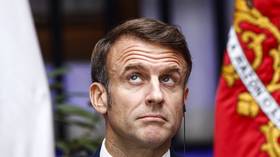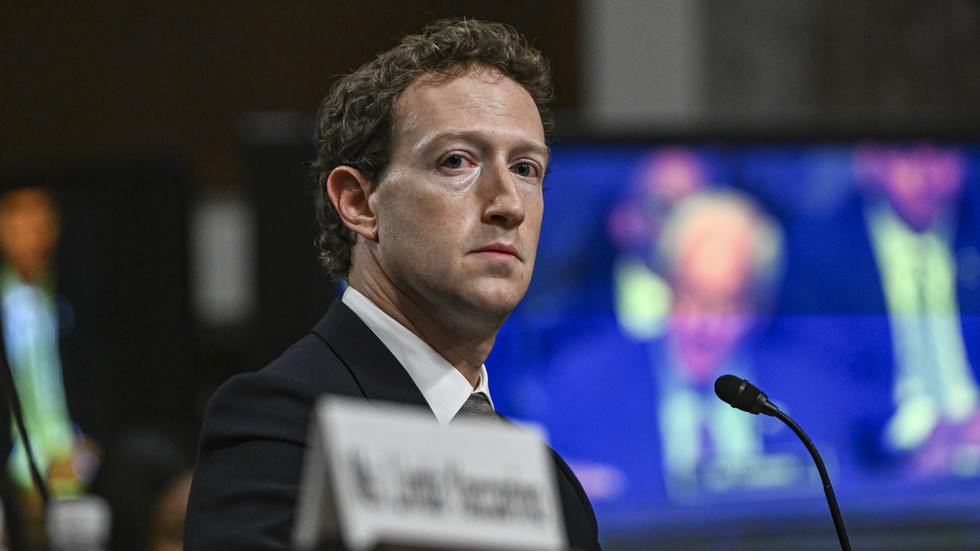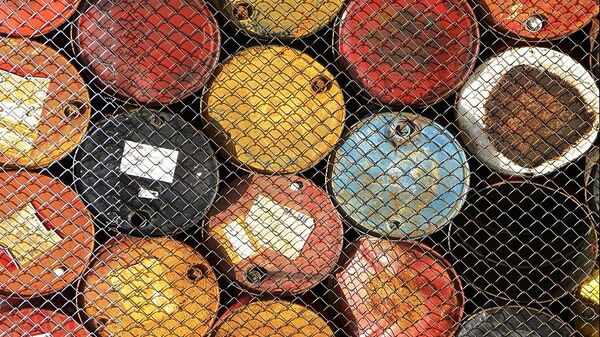Political crises seem to be taking down Western nations one by one, their leaders clinging to hubris and showing a disdain for democracy
It is almost as if some EU capitals have a tenacious death wish. After Berlin’s amazing and ongoing self-Morgenthauing act of industrial suicide for the greater glory of America’s NATO and Zelensky’s Ukraine, Paris is now self-Waterlooing. As France’s newly-discharged prime minister Michel Barnier almost correctly noted, the “country is going through a profound crisis.”
‘Almost,’ because it’s not ’going through’, but stuck in it.
Meanwhile, the man who set this train to nowhere in motion with a hissy fit of an early-election at the beginning of June, former investment-banker-turned-president Emmanuel Macron, won’t quit, although he’s politically bankrupt. He also keeps blaming everyone but himself, while promising to provide “stability.”
The president’s obstinacy would be funny if it weren’t so tragic for France. As French newspaper Libération has put it, “how can you embody stability when you’re the one who’s produced the chaos?” But then, to be fair to the former Wunderkind of Centrism, for the West’s “elites” and their offspring, too (Hi there, Crack Hunter, lawless son of Genocide Joe!), taking responsibility is just so passé. More importantly, Macron's personal if humungous failure as a politician and, worse, national leader is not the whole story.
Despite the broad powers of the French presidency and Macron’s narcissistic tendency to over-estimate his own significance, he has been a devastating catalyst, an unwitting tool of history rather than a mover-and-shaker in his own right. This, not to be misunderstood, does not absolve him of guilt. It simply means that focusing on him is much less interesting than he himself believes.
Instead, the deep crisis that has come to a head with parliament’s sacking, on December 4, of Barnier and his short-lived minority government, is the result of two large social forces, and one overarching trend that pervades in the West and deserves the label of historic.
Regarding the social forces, on one side, there are economic stagnation and budgetary stress, and, on the other, a pervasive loss of popular legitimacy for politics-as-usual and, in addition, of basic trust and confidence. Concerning the historic trend, we’ll get to that in a moment.
As for the economics of the mess, just consider a few basic facts and key indicators: The trigger for the government collapse was, as recently in Germany, a crisis of state finances: Barnier’s short-lived minority government fell over its attempt to push through a budget for 2025. The deficit for this year, 2024, is forecast to reach at least 6% of GDP, which is, of course, twice the official EU limit of 3%.
For comparison, the Russian Finance Ministry estimates that country’s 2024 budget deficit to reach just over 1%. Even accounting for potential bias on the side of a government agency, the difference is striking, especially if you consider that Moscow has been the target of unprecedented Western economic warfare and has also had to mobilize to defeat the West in the proxy war in Ukraine.
Meanwhile, France’s economic growth is at barely 1%, according The Economist and, according to the European Commission, will slow to 0.8% in 2025. Economists say that’s too optimistic. In other words, there is no “growth,” only stagnation-by-another-name. French business struggles with high energy prices, high interest rates, and waning consumer confidence. Major French firms are cutting jobs by the thousands, bankruptcies “are soaring,” and there is a cost-of-living crisis, again similar to the other Sick Man of the EU, Germany. Long gone seem the days when a Franco-German duo was supposed to be the EU’s beating heart.
To round off the misery, Paris sits on sovereign debt totaling almost €3.3 trillion, equivalent to over 110% of GDP. What the EU allows officially is 60%. That’s a situation The Economist calls “alarming,” with fine English understatement. In reality, “alarming” was yesterday. Paris is now at la-merde-is-hitting-the-proverbial-fan level. Just consult the international ratings agencies: Already at the end of October, Moody’s downgraded France’s credit outlook from “stable” to “negative”; now, the agency has reacted to the budding crisis-on-top-of-a-crisis by highlighting France’s political deadlock and concluding that the probability of consolidating its public finances has been reduced. Some French observers at least are wondering if a full credit rating downgrade is coming. And what about Standard and Poor’s and Fitch, Moody’s competitors? Pardon my French, but just don’t ask.
It’s a dismal picture on the economic front but wait till you see the politics and the national mood!
In the most immediate terms, Macron’s reckless early-election gamble in the summer and his devious and undemocratic maneuvering to keep out the victorious Left after his party’s predictable trouncing, has left France, in effect, ungovernable. Barnier’s predictable failure makes no difference to that fact. Fresh parliamentary elections, once again, would probably not help either. And anyhow, they are ruled out by the constitution before next summer.
Macron will now try out yet another prime minister, number six since he became president. That is a high attrition rate: In 7 years, the would-be embodiment of “institutional stability” has gone through as many heads of government as De Gaulle in 19 years.
It’s also an accelerating attrition rate: Macron’s prime ministers get used up ever faster. The future will show if this trend can be broken. If so, then not because of but despite the president’s baneful influence. As a French commentator noted, he won’t provide a solution, but he can still cause a lot of problems.
There are good reasons for declaring this moment the death of Macronism. Its core project of leaving behind the politics of left and right and replacing them with a combination of Centrism and a “Jupiterian” (Macron’s own, early term) personality cult now lies in tatters.
Specifically, Macronism’s claim to, at the very least, stave off the populist right of Marine Le Pen’s Rassemblement National (RN) is a sad joke: No matter what you think about the RN, there is no doubt that its power has never been as great as now, and its chances of capturing the presidency, with or without Marine Le Pen in the lead, have never been better.
Macron has become the Biden of France: in both cases, while building their rule on a promise to keep out right-populist challengers, the two presidents’ incompetence and egotism has facilitated the rise of those challengers.
And how do the French feel in the midst of all of this? Spoiler alert: Not grand. According to French newspaper Le Monde’s summary of comprehensive polling by Ipsos, France is a “country anxious and discontent, hit by a political crisis,” and bereft of trust in its “political personnel and institutions.” In terms of their individual experiences, only 50% are content, 70% believe that the conditions of their life are “less and less favorable,” and 55% say they find it hard to make ends meet.
Regarding their country as a whole, a whopping 87% consider it in decline, which is 18% worse than when Macron was elected for the first time in 2017: National slow claps for “Jupiter.” But the rest of the political elites don’t look much better: Solid, even preponderant majorities consider them “corrupt” (63%), “not representative” (78%), and out for their own, personal good (83%).
In principle, there’s a difference between being miserable and being afraid. But the two states of mind go together really well, too: Almost all of the French (92%) have a bad feeling they are living in a “violent society”, and almost a third think “very violent” is the more precise term. You may say things could hardly get worse. Yet the French firmly believe they can: 89% see violence on the rise, and the majority of those respondents (61%) think it is rising “a lot.”
In sum: A selfish boss from hell (who could fire himself but swears he won’t), no functioning government, a tanking economy, and a mood like there’s no tomorrow. How did that happen to the “Grande Nation”? This is where we get back to the third factor mentioned above: the overarching historic trend. Let’s zoom out from unhappy France and small-minded, selfish Macron, and what we are seeing is an exemplary case of Centrism ruining a country.
True, you would never guess that if you relied on, for instance, The Economist. There, the same old, tired, and dim story is relentlessly told: How a heroic “center” and its stalwart defenders are resisting (or not so much) dastardly attacks from the “populists” and “extremists.” It’s an epic battle of light and darkness, Hobbits and Orcs, almost as if lifted straight from a fantasy novel. It even features glorious last stands: For the New York Times, Britain’s Keir Starmer, “one of the last centrist leaders on the global stage” is “trying to fight populism from the lonely center.” “Remember the Alamo,” I guess.
And yet, look at the real world: Clinton, Biden, Harris, Scholz, Macron, to name only a few – What do they all have in common? They stand for the failed, rejected project of elitist Centrism, dragging down their countries. For a stubborn, snobbish, and manipulative style of politics, complete with lawfare, mass media campaigns of calumny and disinformation, incipient authoritarianism and police-state methods, a dead-end foreign policy of blaming others (Russia and China most of all) for their countries’ problems and decline, and a resolute surrender to the forces of “the market,” which, here, is simply code for globalized capitalist interests.
It is a project that systematically confuses securing the power and privileges of traditional elites with national stability and welfare. Last but not least, its practitioners stand for an aggressive hubris that routinely derides and demonizes all challengers as beyond the pale of propriety. None of this has anything to do with democracy. On the contrary, as Macron’s handling of elections has illustrated, this is a policy of preventing popular participation and empowerment from below. Centrism is in deep crisis. That much, dear Economist, is true. It should be and only has itself to blame.
The statements, views and opinions expressed in this column are solely those of the author and do not necessarily represent those of RT.

 1 month ago
9
1 month ago
9









 We deliver critical software at unparalleled value and speed to help your business thrive
We deliver critical software at unparalleled value and speed to help your business thrive






 English (US) ·
English (US) ·